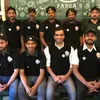From a rejected US visa to building a business with Rs 50 Cr turnover - story of Bengaluru's Vasudev Adiga
Established in 1993, Adiga’s was sold to New York’s New Silk Route Venture Capital in 2017. Vasudev Adiga started Sri Anantheswara Foods in 2018, and now manages two brands — Nandi Upachar and Paakashala — under its umbrella.
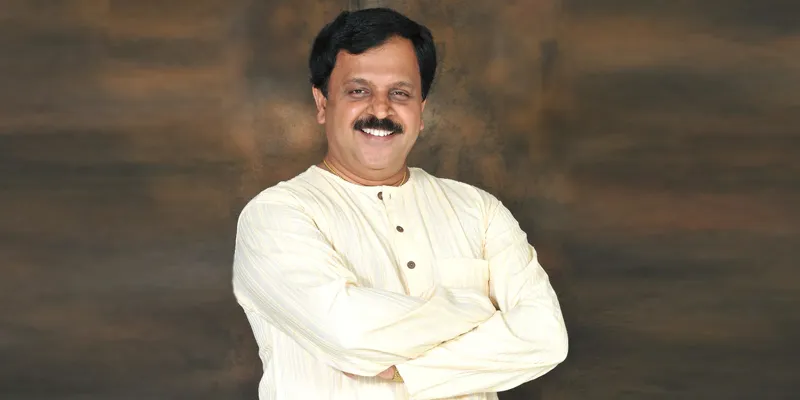
Vasudev Adiga, Founder of Sri Anantheswara Foods | Image Source: Vasudev's team
Sometime in the last decade, engineers from India’s top institutions started quitting their cushy jobs to start tech companies. And this trend picked up quite fast. In fact, a 2017 report by Randstad Workmonitor stated that 83 percent of the Indian workforce wanted to become entrepreneurs, with 56 percent of respondents indicating that they were considering leaving their jobs then.
However, it is not every day that we come across the stories of engineers who quit their job to start a food business in the early 90s’.
Vasudev Adiga quit his job to follow his passion for food. He founded Adiga’s — a darshini — a vegetarian restaurant with limited and affordable food items, which became a household name in Karnataka since 1993.
After establishing 30 outlets across Bengaluru, Vasudev exited the company, selling it off to the New Silk Route Venture Capital from New York. In 2018, he began another restaurant-chain venture — Sri Anantheswara Foods Pvt Ltd. The new restaurant chain currently boasts of two brands, Nandi Upachar and Paakashala. The group recorded a turnover of more than Rs 50 crore last year.
However, entrepreneurship did not come easy to Vasudev, and his journey was full of highs and lows.
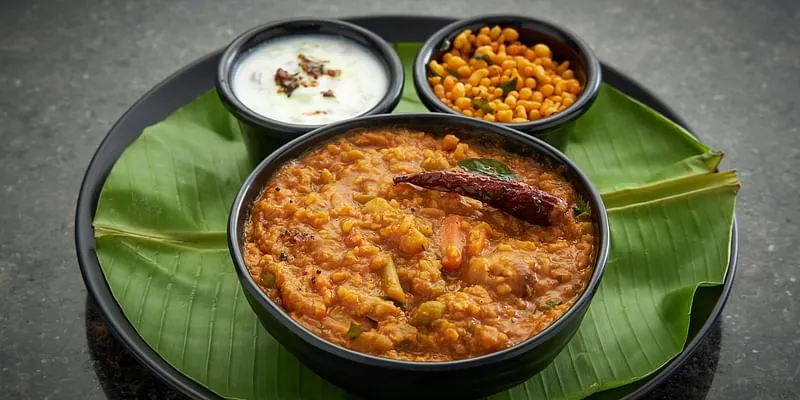
Bise bele bath served at Paakashala | Image Source: Vasudev's team
Roots in the food business
Originally from Kundapura, a small town in the Udupi district of Karnataka, Vasudev grew up among seven siblings in Bengaluru. “My mother is an outstanding cook, and she played an important role in my love for food,” Vasudev tells SMBStory.
His mother KN Saraswathi, is a pioneer in traditional food preparation. One of south Bengaluru’s landmarks, Brahmin’s Coffee Bar, started in the 1960s, was her brainchild. Vasudev was always passionate about food and would often help his mother in her Brahmin’s Coffee Bar kitchen.
Meanwhile, starting up in the food space was never something that Vasudev had planned earlier. An Electronics Engineer from BMS College of Engineering, Bengaluru, he was keen on pursuing his Master’s from an American university.
However, as luck would have it, he did not get a visa. “I got jobs in many companies thereafter, but I was never content with my professional career,” Vasudev admits.
Inspired by his mother, Vasudev borrowed some money from his father and started an eatery in Basavanagudi, called Sri Lakshmi Venkateshwara Fast Food.
With an initial investment of Rs 1.5 lakh borrowed from a bank, he established Adiga’s. “My concept of a darshini brought a new format of food service to Karnataka. I built on this concept to further introduce multiple formats of the humble darshini,” he says.
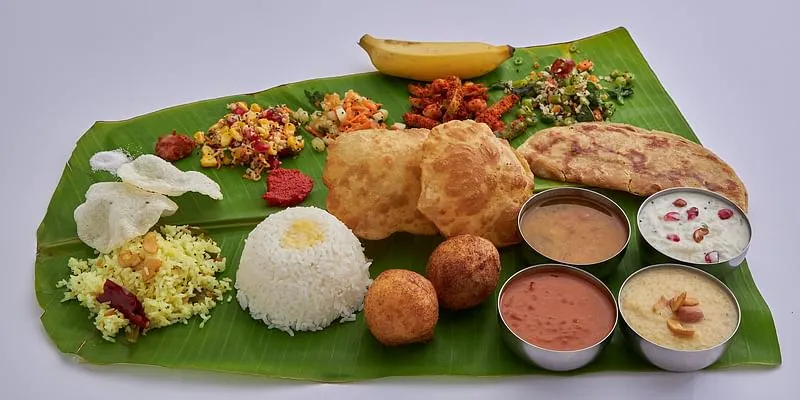
Bale ele oota at Paakashala | Image Source: Vasudev's team
The Adiga’s story
Vasudev says, “We have a very peculiar problem in India – the cuisine is regional. What’s lip-smacking in one region is not known or not accepted in another.” The restaurant chain served Udupi cuisine, along with north Indian and Chinese cuisines.
But why darshini?
“Food that can be cooked quickly, is economically priced, and can be eaten every day was the need of the hour. I started the first Adiga’s outlet and focussed on this insight,” he says. Vasudev opened the first Adiga’s outlet on DVG Road, Basavanagudi.
Once it became a success, he scaled it up to 13-odd restaurants across the city. It also moved to larger formats like fine-dining multi-cuisine restaurants, and also established darshini-cum-AC service restaurant and darshini-cum-banquet halls. It also took corporate, as well as outdoor catering.
Over 10 years, Vasudev borrowed and invested another Rs 20 crore in the company.
In 2012, Vasudev partnered with the New Silk Route Venture Capital, with the idea of taking the brand to a global market. The New York-based growth capital firm infused Rs 110 crore in private equity in Adiga's.
Consequently, in 2017, Vasudev decided to exit the company and sold the brand completely to New Silk Route. At that time, Adiga’s had 30 outlets, with more branches coming up in the cities of Kolar, Kollur, and Maddur.
Second-innings
“I decided to exit as a business decision. You know how we entrepreneurs are, we cannot sit still,” Vasudev says.
A year later, in 2018, he started Sri Anantheswara to establish two more brands — Nandi Upachar and Paakashala. Under Nandi Upachar, the brand operates two multi-cuisine restaurants on the Bengaluru-Hyderabad highway.
Nandi Upachar has been established to serve customers on the highways, and has two restaurants with bigger spaces to accommodate more people and service quick meals.
“Our emphasis was laid on quality food, quick service, and hygiene — clean toilets to serve the weary travellers, with ample car-parking space,” Vasudev says.
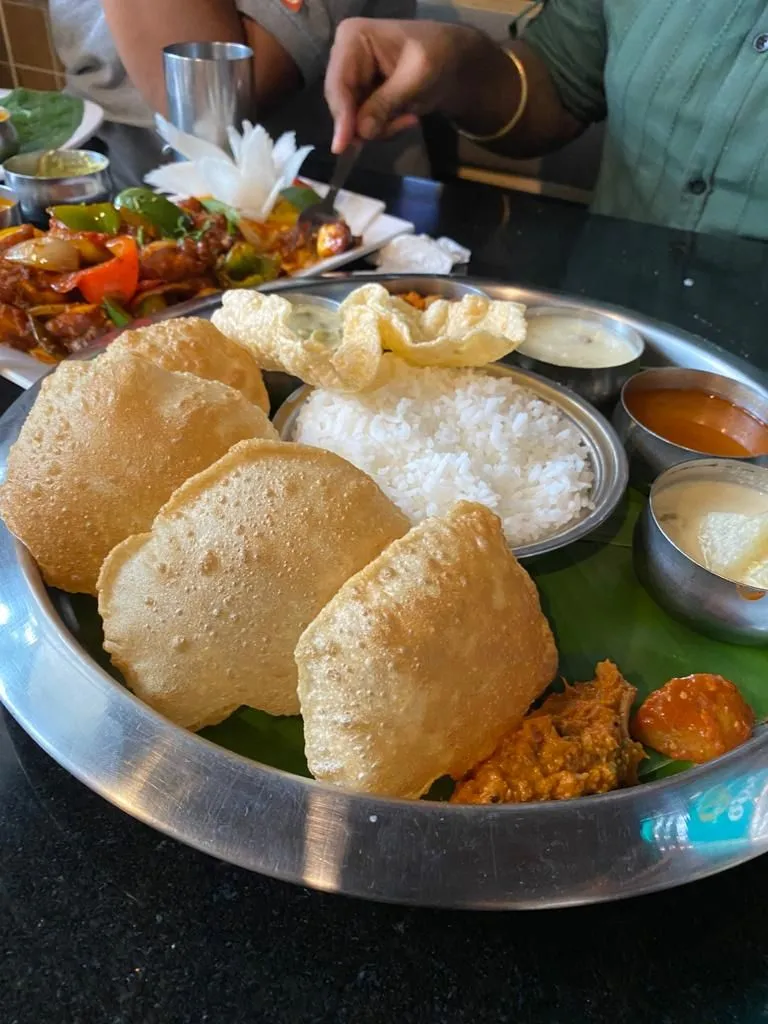
Assorted food thali served at Paakashala | Image Source: Vasudev's team
On the other hand, Paakashala is a chain of eight vegetarian restaurants, serving south Indian, north Indian, and Chinese delicacies across eight outlets in Bengaluru. This format of restaurants caters to the population of Bengaluru that have migrated to the city to pursue a career.
“They rely on a format like Paakashala for breakfast, lunch, and even dinner every day. Stepping out to grab a quick breakfast or lunch is a way to catch up with colleagues for a large section of this population. Our outlets are typically busy catering to this need,” the founder adds.
Additionally, Paakashala caters to families and friends who step out for a leisure meal. “We have more outlets in the pipeline,” he reveals.
The group employs over 600 people directly across the 10 outlets.
Restaurant business during the pandemic
According to Mordor Intelligence, the India foodservice market is forecasted to reach $95.75 billion by 2025, growing at a CAGR of 10.3 percent between 2019 and 2025.
However, the coronavirus pandemic has severely hit the restaurant industry, pausing dining-in. According to the National Restaurant Association of India — which represents over five lakh restaurants — nearly 90 percent of them shut shop after the nationwide lockdown in March-end, 2020.
Meanwhile, Paakashala and Nandi Upachar outlets have been open for takeaways and deliveries since the first week of April. “We saw a steady increase in the number of people coming to pick-up food, as well as order off Swiggy, and Zomato,” Vasudev says.
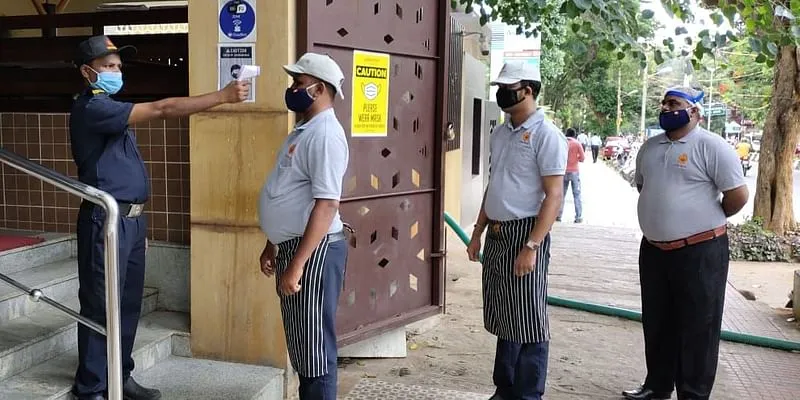
Stringent steps are taken in the Paakashala and Nandi Upachar outlets to ensure safety and hygiene | Image Source: Vasudev's team
On June 8, it opened all its outlets for dine-in at 50 percent capacity to facilitate social-distancing. All the Paakashala and Nandi Upachar outlets have been taking stringent steps to ensure safety and hygiene, as well as sanitising their kitchens every four hours. It has been fulfilling its orders through Swiggy, Zomato, and Dunzo.
Vasudev’s new venture Sri Anantheswara is now focussing on keeping its fixed costs under control. However, the turnover for this year looks uncertain for the company as the business has dipped by 60 percent.
Nonetheless, Vasudev says, “People are still wary of dining in and prefer to take away or order online. I do see the situation coming back to normal, but it will take time.”
Edited by Suman Singh




